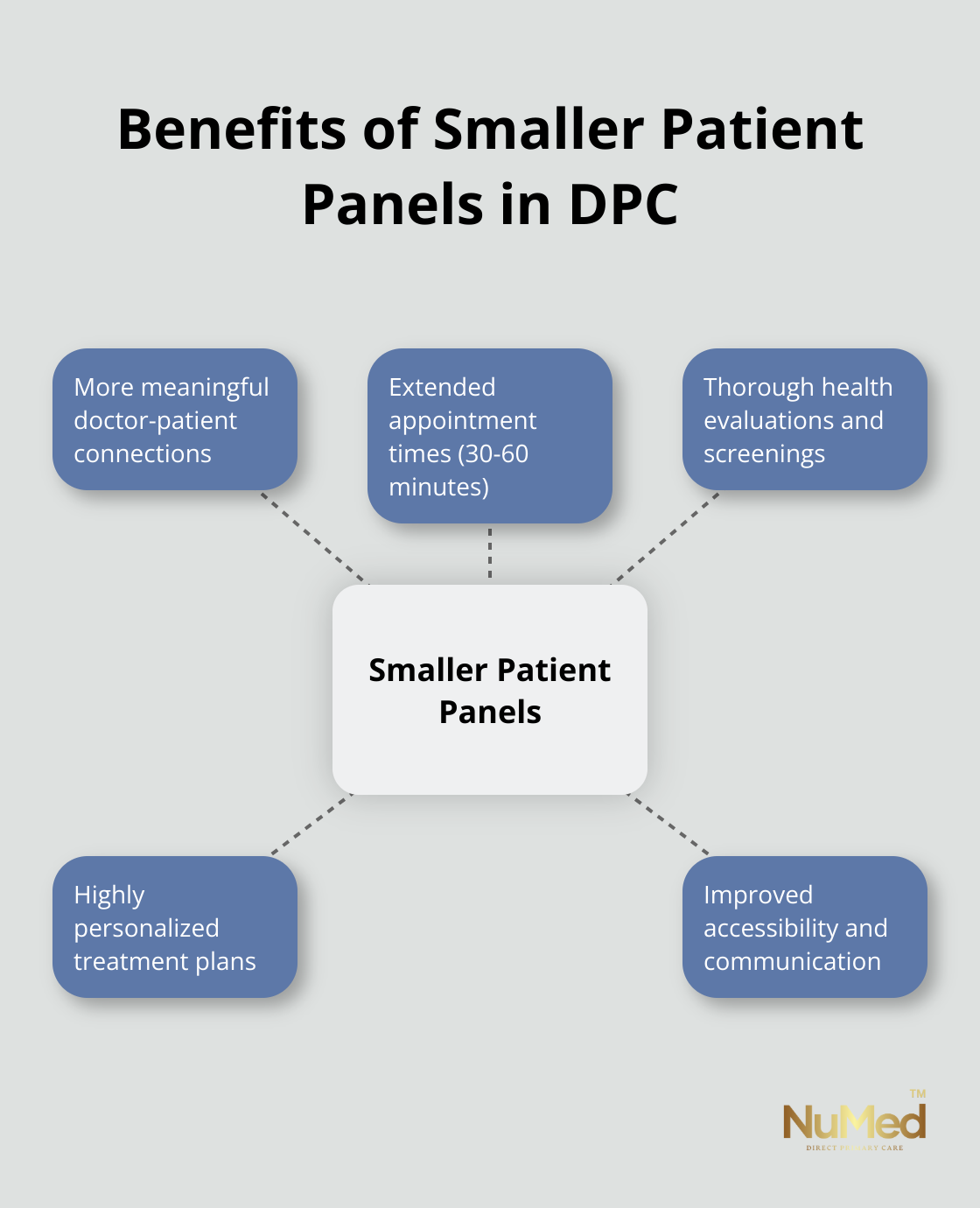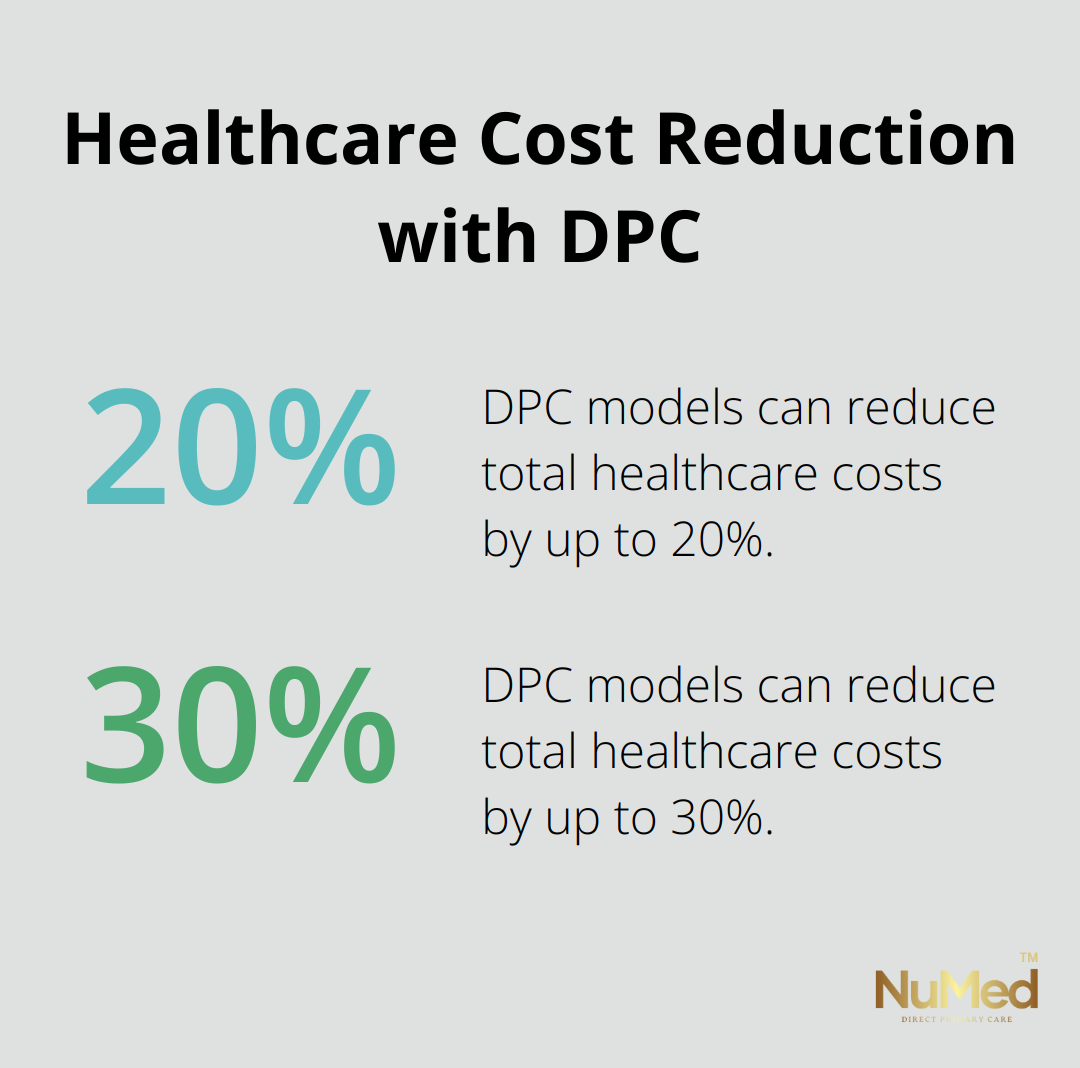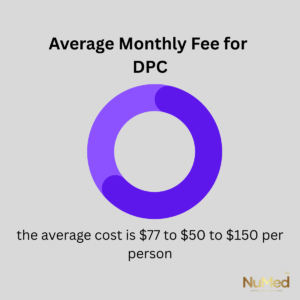At NuMed DPC, we’re revolutionizing healthcare with personalized medicine tailored to each patient’s unique needs.
Direct Primary Care (DPC) is transforming the doctor-patient relationship, offering a more intimate and comprehensive approach to health management. This model prioritizes individualized care, extended appointment times, and improved accessibility.
In this post, we’ll explore how DPC enables customized treatment plans and delivers long-term benefits for patient health outcomes.
What is Direct Primary Care?
Direct Primary Care (DPC) revolutionizes healthcare delivery by removing insurance companies from routine medical care. Patients pay their primary care physician a monthly or annual fee, which covers most primary care services, including consultations, care coordination, and basic procedures.
A Patient-Centered Approach
DPC transforms the traditional doctor-patient dynamic. While conventional practices often require physicians to see 25-30 patients daily (spending only 15-20 minutes with each), DPC physicians manage smaller patient panels. This allows for longer appointments (typically 30-60 minutes), which fosters stronger doctor-patient relationships.
Transparent Pricing and Accessibility
DPC practices stand out for their financial transparency. They often display clear pricing for all services, which eliminates unexpected bills. A study by the Journal of the American Board of Family Medicine found that DPC practices charge an average monthly fee of $77 for an adult patient.
Focus on Preventive Care
Prevention takes center stage in the DPC model. With more time and fewer patients, physicians can thoroughly examine patients’ health histories, lifestyle factors, and potential risks. This proactive strategy often leads to earlier detection of health issues and more effective management of chronic conditions.
Improved Health Outcomes
The DPC model’s effectiveness is backed by research. This approach can lead to improved patient outcomes and better management of chronic diseases such as obesity, hypertension, and diabetes within DPC patient populations.
As we explore the personalized care aspect of DPC in the next section, you’ll see how this model truly puts patients at the center of their healthcare journey.
How DPC Personalizes Your Healthcare
Direct Primary Care (DPC) revolutionizes healthcare by placing personalized attention at its core. This approach transforms the traditional doctor-patient relationship, offering individualized care often absent in conventional healthcare settings.
Building Meaningful Relationships
DPC physicians manage smaller patient panels (typically 600-800 patients) compared to traditional practices (2,500-3,000 patients). This reduction allows doctors to form more meaningful connections with their patients. Understanding a patient’s lifestyle, stressors, and personal health goals becomes essential for effective care.

Time: A Precious Resource
Regular follow-up visits are critical for managing chronic conditions, yet some primary care clinics achieve higher visit regularity than others. This extended time enables thorough discussions about health concerns, lifestyle factors, and preventive strategies. Patients receive the attention they deserve, leading to more comprehensive care.
Accessibility on Your Terms
DPC practices often provide same-day or next-day appointments, which reduces wait times and enables timely interventions. Many DPC providers offer direct communication channels (email, text, or video calls). This increased accessibility can improve health outcomes by addressing concerns promptly and reducing unnecessary emergency room visits.
Comprehensive Health Assessments
The DPC model emphasizes thorough health evaluations. These assessments extend beyond standard check-ups, often including advanced screenings and in-depth discussions about family history, lifestyle habits, and potential risk factors. A study in the Journal of the American Board of Family Medicine found that DPC patients were more likely to receive preventive services (such as cancer screenings and vaccinations) compared to those in traditional care models.
Tailored Treatment Plans
With a deeper understanding of each patient’s unique health profile, DPC physicians can create highly personalized treatment plans. These plans consider not just symptoms, but also lifestyle factors, personal preferences, and long-term health goals. This tailored approach often leads to more effective and sustainable health outcomes.
The personalized care offered by DPC practices reshapes the healthcare landscape, improving patient satisfaction and health outcomes. As we explore the next section on customized treatment plans, you’ll see how this individualized approach translates into practical, patient-centered healthcare strategies.
How DPC Tailors Treatment Plans
Comprehensive Health Profiling
DPC practices create customized treatment plans by conducting thorough health assessments. These assessments extend beyond standard medical histories and include genetic predispositions, environmental factors, and lifestyle choices. Studies have shown that DPC models can cut total healthcare costs by 20% to 30% due to reduced emergency room visits, fewer hospitalizations, and lower overall healthcare utilization.

Patient Preferences Integration
DPC recognizes that patient engagement plays a key role in successful treatment outcomes. A survey by the Patient-Centered Outcomes Research Institute revealed that 78% of patients who actively participated in their treatment decisions reported better adherence to their care plans. DPC providers take the time to understand preferences, concerns, and goals. This might involve exploring alternative therapies, adjusting medication schedules to fit lifestyles, or incorporating specific dietary preferences into nutrition plans.
Adaptive Care Strategies
Healthcare isn’t static, and neither are DPC treatment plans. DPC employs a flexible approach that allows for quick adjustments based on progress and changing needs. This might involve frequent check-ins, telemedicine consultations, or real-time monitoring of certain health metrics (e.g., blood pressure, glucose levels). A study in the Journal of General Internal Medicine found that this adaptive approach can lead to a 25% improvement in managing chronic conditions compared to traditional, fixed treatment plans.
Personalized Preventive Care
DPC focuses on preventing health issues before they arise. Providers create individualized preventive care plans based on each patient’s risk factors and health goals. This might include personalized screening schedules, tailored exercise recommendations, or specific nutritional guidance. Studies demonstrate that DPC’s focus on personalized, accessible care often results in fewer emergency room visits and hospitalizations, attributable to the emphasis on preventive care and early intervention.
Collaborative Care Coordination
DPC providers act as health advocates and coordinators. They work closely with specialists when needed, ensuring seamless communication and integrated care. This collaborative approach (which often includes regular care team meetings) helps to create a more cohesive and effective treatment plan. A study in Health Affairs found that this type of coordinated care can reduce hospital admissions by 18% and emergency department visits by 36%.
Final Thoughts
Direct Primary Care (DPC) leads the personalized medicine revolution, transforming healthcare with its patient-centric approach. DPC removes traditional barriers, enabling tailored health plans that improve outcomes and satisfaction. Extended appointments and stronger doctor-patient relationships result in more accurate diagnoses and treatment plans aligned with individual lifestyles and goals.
DPC’s focus on preventive care and early intervention helps patients avoid serious health issues. Regular check-ins and easy provider access ensure prompt problem detection and resolution. This proactive strategy improves overall health and reduces the need for costly emergency care and hospitalizations.
At NuMed Primary Care, we offer comprehensive lab services, functional medicine approaches, and health coaching to address root causes of illness. Our patients experience accessible, transparent, and personalized healthcare without traditional insurance complexities. DPC will shape a healthcare system that truly serves individuals, transforming lives through tailored care plans.

















